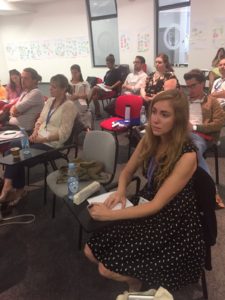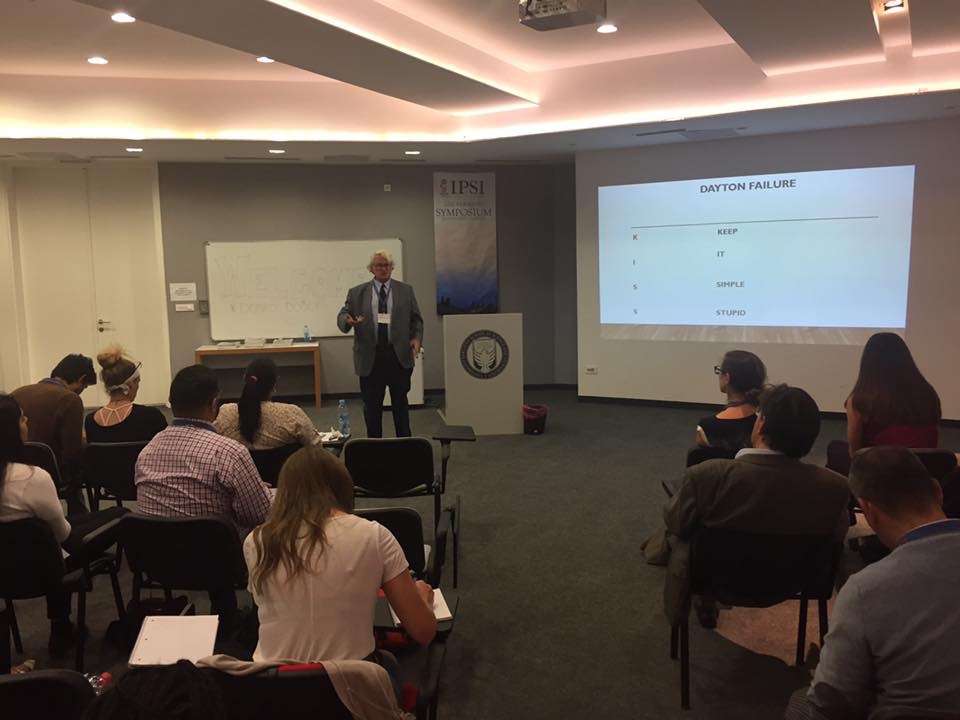
By Alexandria Farris
The first day of the Sarajevo symposium introduced the complexity of post-conflict societies. At first glance, a post-conflict transition may appear as a somewhat generalizable idea that all post-conflict transitions can be approached from the same theoretical point of view. For the general public, the idea of a war to post-war transition may appear something like the following: war is going on, lives are lost, a formal agreement is made, the extreme violence ends, and (hopefully) there is some rebuilding of the community and infrastructure. But once the violence ends, it seems that the damaged society is no longer a top priority on headline news – after all, if there’s no war, then there must be peace, right?
However, this is an uninformed image of the transitions after war. One of the recurring questions at the symposium thus far is whether or not transitions ever truly end. Even without the bloodshed, the complexities can intensify, exacerbating the deep-rooted problems in all levels of society. The fighting, though possibly nonviolent, continues. All of our guest speakers illustrated this point with specific examples from the cases of Central Sahel and the former Yugoslavia, most specifically, Bosnia. The war here ended more than twenty years ago, yet there are still unresolved structural issues that keep the society divided and not functioning properly in many aspects.
The science of social psychology has shown us that when it comes to human behavior, the situation always matters. A person may have a stable, predictable personality, yet that same person’s behavior will change from situation to situation. The same idea works for group interactions. Transitions could be considered a series of group and interpersonal interactions, so the context and the local community also matters, not just who is involved and what events have taken place. When looking at peace inventions, this means that one transition cannot necessarily be generalized to another transition. Our guest speaker and experienced consultant of international transition and conflict, Audra Dykman, illustrated the importance of approaching each post-conflict transition from a sociological-anthropological point of view. These are negotiations with human beings and when we work with human beings, we must understand their context, their story, and their beliefs.
Each society that has experienced conflict, despite the shared and unfortunate events of war, varies tremendously in context and culture. Those working in peacebuilding and transitions must understand the community and culture in which they work, as well as be ready to adapt to the local reality. Our advisor in residence and former Chief of Staff and Senior Deputy for Human Rights for the OSCE Mission to Bosnia and Herzegovina, William Stuebner, also mentioned the importance of remembering that the work we do involves and affects human beings. He explained that 1 + 2 does not equal 3 if that’s not what people believe, and in the cases of complex transitions, what people believe is not always what is accepted as an objective fact. It is important to remember and adjust to these human elements when designing and implementing peace interventions.
Knowledge vs. beliefs brought us to one of the final themes of the day where we discussed the issue of young people, refugees, and education. There were many young refugees that escaped during the war and many young people even today who have left Bosnia, mainly to other parts of Europe and the United States, in search of a better life – higher salaries, educational opportunities, different standard of living, etc.
The former president of the Federation of Bosnia and Herzegovina, Dr. Ejup Ganić, spoke to us about his hope in the youth of his country and even the young people of other countries who will make the necessary societal changes and keep Bosnia in the international spotlight. It is ultimately education that has the power to end conflict in the long term and bring peace and prosperity to a community. However, the process of educating the younger generation and encouraging them to stay in their homeland of Bosnia is still a long and ongoing process.


